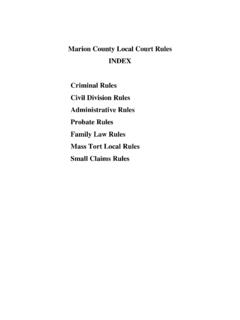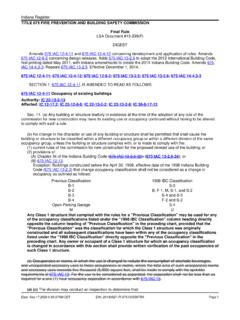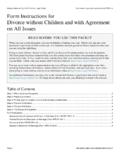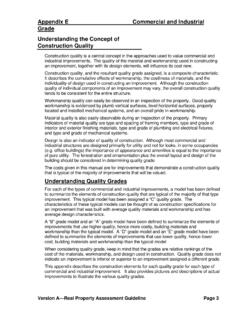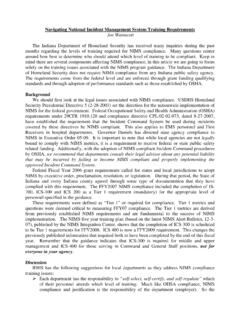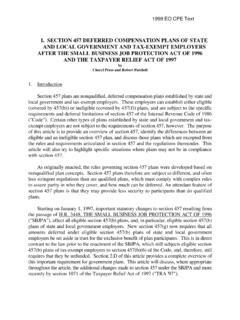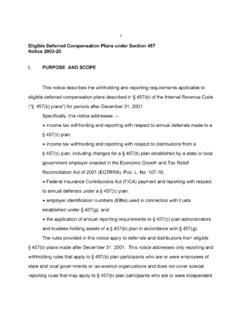Transcription of INFORMATION BULLETIN # 28 - IN.gov
1 INFORMATION BULLETIN #28 INCOME TAX NOVEMBER 2016 (Replaces INFORMATION BULLETIN #28, dated May 2012) Effective Upon Publication SUBJECT: Application of State and County Income Taxes to Residents with Out-of-State Income and Nonresidents with Indiana Source Income REFERENCES: IC ; IC 6-3-1-12; IC 6-3-1-13; IC 6-3-2-2; IC 6-3-3-3; IC 6-3-4-15; IC 6-3-5-1 DISCLAIMER: INFORMATION bulletins are intended to provide nontechnical assistance to the general public. Every attempt is made to provide INFORMATION that is consistent with the appropriate statutes, rules, and court decisions. Any INFORMATION that is inconsistent with the law, regulations, or court decisions is not binding on either the department or the taxpayer.
2 Therefore, INFORMATION provided in this BULLETIN should serve only as a foundation for further investigation and study of the current law and procedures related to its subject matter. INTRODUCTION Full-year Indiana residents must report all income that is reported for federal income tax purposes on their Indiana individual income tax return (Form IT-40). This includes all income, even if it is derived from sources outside Indiana. Full-year nonresidents who received income from Indiana sources must file an Indiana individual income tax return (Form IT-40 PNR). They are subject to tax on that part of their total federal income that is derived from or connected with Indiana sources.
3 If the nonresident s only Indiana source income was from an Indiana partnership or S corporation, the nonresident shall be included in the entity s composite return and is not be required to file Form IT-40 PNR, though the individual may file a Form IT-40 PNR if the individual so chooses. Part-year Indiana residents must file an Indiana individual income tax return (Form IT-40 PNR). They are subject to tax on that part of their total federal income that was received while they SUMMARY OF CHANGES Aside from minor, technical changes, this BULLETIN is changed to reflect the repeal of the non-Indiana locality deduction, to reflect the allowance of credit against all county income taxes, and to state that California is no longer a reverse-credit state effective for the 2017 tax year.
4 INFORMATION BULLETIN #28 Page 2 were residents of Indiana. In addition, they are also taxable on income from Indiana sources received while they were nonresidents of Indiana. If a joint federal income tax return is filed, a joint Indiana return is also required. If separate federal income tax returns are filed, separate Indiana returns are also required. If one spouse is a full-year Indiana resident, the other spouse is a non-resident for all or part of the year, and the spouses file a joint federal income tax return, the couple must file a joint Form IT-40 PNR, reporting their respective incomes as stated above. I. INCOME RECEIVED FROM INDIANA SOURCES Income received from Indiana sources is considered Indiana income to nonresidents, except certain types of Indiana source income subject to tax only by the taxpayer s state of legal residence.
5 Interest, dividends, royalties, and gains from the sale of capital assets are subject to tax only by the taxpayer s state of legal residence unless such income results from the conduct of a trade or business in Indiana. If a trade or business is conducted in Indiana, the income should be reported as Indiana income. Income from a qualified pension, annuity, or profit sharing plan is subject to tax by the taxpayer s state of legal residence. Lump sum distributions from qualified plans are subject to tax by the state that, at the time of distribution, is the taxpayer s state of legal residence. deferred compensation other than from a qualified retirement plan, accumulated vacation, bonus, severance, sick pay, or income from a stock option plan are directly attributable to services performed and are taxable by the state where the services were performed.
6 II. STATE TAX AGREEMENTS Taxpayers may be subject to individual income tax by both their state of residence and the state from which the income is derived. The state of Indiana has entered into agreements with several states to eliminate the requirement of paying tax to two states on the same income. Tax treatment of out-of-state income depends upon the type of income and the state from which the income is derived. In the case of tax credits, Indiana only allows credits for individual income tax paid to other states or localities. Other taxes such as property taxes, corporate income taxes, and unincorporated business taxes are not allowed as a basis for claiming such credits.
7 A worksheet indicating how the credit was computed and a copy of the tax return filed with the other state must be attached to the Indiana return. Withholding statements or other evidence of tax payments are not accepted. A copy of Federal Form 1116 (Computation of Foreign Tax Credit) must be attached if the credit is claimed for tax paid to a foreign country. In computing the credit allowed by Indiana, adjusted gross income that is subject to tax in both states should be used as a basis for calculating the allowable credit. Adjustments that increase or decrease the taxable amount in other states should not be considered in calculating the allowable INFORMATION BULLETIN #28 Page 3 credit.
8 For example, State A allows a deduction for medical expenses, but Indiana does not; therefore, the credit would be based on the income before the medical expense deduction. III. RECIPROCAL AGREEMENT STATES Five states have a reciprocal agreement with the state of Indiana. They are Kentucky, Michigan, Ohio, Pennsylvania, and Wisconsin. All salaries, wages, tips, and commissions earned in these states by an Indiana resident must be reported as if they were earned in Indiana. A credit cannot be taken for any taxes withheld by or paid to any of these states in connection with income from salaries, wages, tips, and commissions. If taxes have been withheld or paid to any of these states, a claim for refund should be filed with that state by filing that particular state s income tax form for nonresidents.
9 Residents of Kentucky, Michigan, Ohio, Pennsylvania, and Wisconsin who have Indiana income will report and pay tax on that income to their state of residence. If a resident of one of the above states has wages, salaries, tips, or commissions from Indiana sources, and the individual s only income from Indiana sources is wages, salaries, tips, or commissions, Form IT-40 RNR must be filed. A credit for Indiana state and county tax withholding amounts will be allowed, and any Indiana county tax liability will be figured. If a resident of one of the above states has income from Indiana other than wages, salaries, tips, or commissions, Form IT-40 PNR must be filed.
10 IV. REVERSE CREDIT AGREEMENT STATES The reverse credit agreement applies to Indiana residents who have income from the following jurisdictions and to residents of those jurisdictions who have income from Indiana. Included are Arizona, Oregon, and Washington, Effective for tax years 2017 and later, California is no longer treated as a reverse credit state. For example, a resident of Indiana with rental income from property owned in a reverse credit state will file a resident Indiana return and include the rental income on the Indiana return. The taxpayer will file a nonresident return for the state where the income was earned and claim a credit for the taxes paid to Indiana on the rental income.

